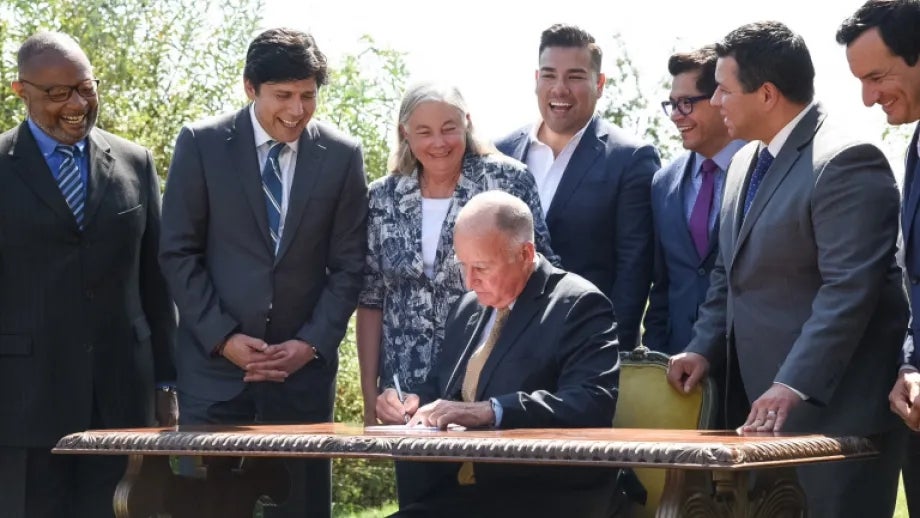Governor Brown Signs Historic Climate Change Legislation
Adapted from a press release issued by the governor’s office.
LOS ANGELES - Ten years after California adopted the toughest greenhouse gas emission reduction goals in the nation, Governor Edmund G. Brown Jr. yesterday strengthened that commitment, signing Senate Bill 32 by Senator Fran Pavley (D-Agoura Hills) and Assembly Bill 197 by Assemblymember Eduardo Garcia (D-Coachella), which require the state to cut emissions at least 40 percent below 1990 levels by 2030 and invest in the communities hardest hit by climate change.
"Climate change is real, and knowing that, California is taking action," said Governor Brown. "SB 32 and AB 197 are far-reaching moves that continue California on its path of vast innovation and environmental resilience."
Governor Brown signed the legislation from the Vista Hermosa Natural Park, a 10-acre urban wilderness project built atop an old oil field and the first public park built in more than 100 years in the densely populated western edge of downtown Los Angeles.
California is on track to meet or exceed the current target of reducing greenhouse gas emissions to 1990 levels by 2020, as established in the California Global Warming Solutions Act of 2006 (AB 32). The new 2030 requirement in SB 32 will help make it possible to reach the ultimate goal of reducing emissions 80 percent under 1990 levels by 2050.
"With its Clean Car Law in 2002 and the Global Warming Solutions Act in 2006, California took a global lead in adopting policies to clear the air, transition to clean energy and reduce climate pollution," said Senator Pavley. "Those policies have fueled billions of dollars in private investment and spawned a thriving clean-energy sector. SB 32 sends an unmistakable message that California is resolute in its commitment to remain on that healthy and prosperous course."
"In order for California to remain an economic and environmental leader the state will need to also be a trailblazer on issues related to equity," said Assemblymember Garcia. "Placing the health and economic impacts of climate policy on vulnerable populations second will stunt the state's prosperity."
AB 197 establishes a legislative committee on climate change policies to help continue to ensure the state's actions to reduce greenhouse gas emissions are conducted with transparency and accountability.
"Today is a proud day for California," said Senate President pro Tempore De León. "Together we redoubled our commitment to global climate leadership and building the clean energy economy of tomorrow, while ensuring environmental justice so all Californians benefit from our climate policies."
"SB 32 extends California's landmark greenhouse gas reduction goals. AB 197 changes the game on how we make sure those goals are reached," said Assembly Speaker Anthony Rendon. "The successful effort behind these two bills is the latest sign of a growing consensus that protecting the environment and improving public health are inextricably linked and that maintaining that link is key to advancing future environmental actions. The Assembly -- where AB 32 was passed 10 years ago -- will be vigilant and vigorous in making sure California's climate change goals are met, and are met as we all intended."
Previously, the governor issued an executive order last year to reduce greenhouse gas emissions in California 40 percent below 1990 levels by 2030, a goal which is now codified by SB 32.
For full text of the bills, visit: http://leginfo.legislature.ca.gov


Submit your comment
In order to receive a reply to your comment, please provide an email address.